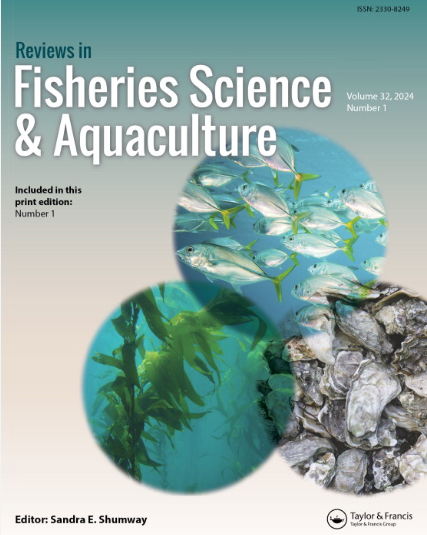两种热带海洋桡足类展示了大规模生产所需的生理特性
IF 5.3
1区 农林科学
Q1 FISHERIES
引用次数: 2
摘要
摘要热带半咸淡鱼塘系统中,南洋假蝶爪鱼和罗氏Apocyclops两种与鱼虾幼体饲料相关的桡足类常年处于优势地位。池塘环境理化性质恶劣;温度20 ~ 32℃,盐度15 ~ 23,盐度骤降15 ~ 9,频繁严重缺氧,营养品质差。在50个研究几个生理终点的研究中,P. annandalei在18-32°C和盐度10-30的环境中表现最佳,而A. royi在24-32°C和盐度10-32的环境中表现最佳。最极端的是,据报道在盐度50和实验室中有罗氏单胞杆菌;当它以贝克酵母为食时,它可以在两代内从盐度调整到淡水。这两个物种,特别是罗氏单胞菌已经发展出一种出色的能力,将摄入的脂肪酸组成较差的脂肪酸转化为其组织所必需的长链多不饱和脂肪酸(PUFAs)。因此,它们会自我丰富自己体内的脂肪酸。它们的生理可塑性可能是在恶劣的池塘环境中大量生产的先决条件。此外,罗氏拟虾还具有高密度耐受性,适合集约化大规模生产,是两种鱼类和虾类孵化场中最有前途的活饲料。本文章由计算机程序翻译,如有差异,请以英文原文为准。
Two Tropical Marine Copepods Demonstrate Physiological Properties Needed for Mass Production
Abstract Two live feed relevant copepods for larval fish and shrimps, Pseudodiaptomus annandalei and Apocyclops royi, were predominant year-round in a tropical brackish fishpond system. The ponds environment is harsh concerning physicochemical properties; temperature 20–32 °C, salinity 15–23 besides abrupt salinity drops 15–9, frequent severe hypoxia, and poor nutritional seston quality. In 50 studies investigating several physiological endpoints, P. annandalei performs optimally within 18–32 °C and salinity 10–30 and A. royi within 24–32 °C and salinity 10–32. Most extreme, A. royi is reported in situ at salinity 50 and in the laboratory; it can adjust from salinity 20 to freshwater within just two generations when fed on Baker’s yeast. Both species and in particular A. royi have developed an outstanding capability to convert ingested seston with poor fatty acid composition into the necessary long-chained polyunsaturated fatty acids (PUFAs) characterizing their tissues. Hence, they self-enrich their bodies’ fatty acid profiles. Their physiological plasticity is likely a prerequisite for existing extensive mass production in the harsh pond environment. Moreover, A. royi exhibit additional traits, that is, high density tolerance qualifying also for intensive mass production suggesting it as the most promising live feed of the two species for fish and shrimp hatcheries.
求助全文
通过发布文献求助,成功后即可免费获取论文全文。
去求助
来源期刊

Reviews in Fisheries Science & Aquaculture
FISHERIES-
CiteScore
25.20
自引率
0.90%
发文量
19
期刊介绍:
Reviews in Fisheries Science & Aquaculture provides an important forum for the publication of up-to-date reviews covering a broad range of subject areas including management, aquaculture, taxonomy, behavior, stock identification, genetics, nutrition, and physiology. Issues concerning finfish and aquatic invertebrates prized for their economic or recreational importance, their value as indicators of environmental health, or their natural beauty are addressed. An important resource that keeps you apprised of the latest changes in the field, each issue of Reviews in Fisheries Science & Aquaculture presents useful information to fisheries and aquaculture scientists in academia, state and federal natural resources agencies, and the private sector.
 求助内容:
求助内容: 应助结果提醒方式:
应助结果提醒方式:


